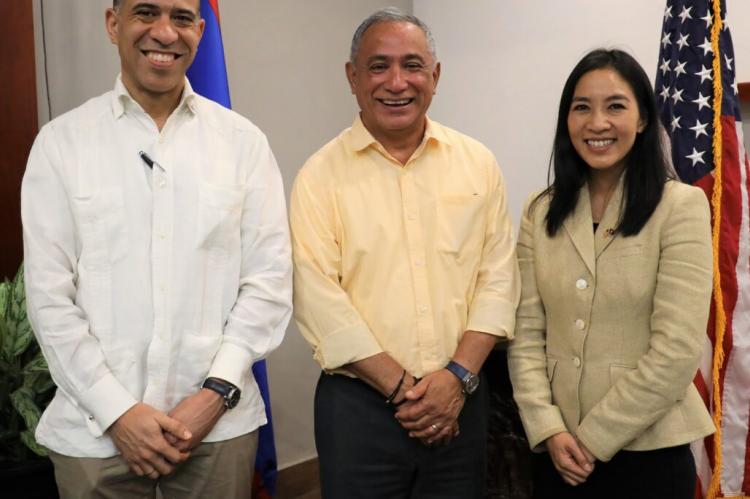"Belize Strikes $125 Million Deal: Can MCC’s Bold Partnership Deliver Lasting Change?"
By: Omar Silva
Editor: National Perspective Bz DIGITAL 2024
Belize City: Wednesday 4th September 2024
The recent partnership between the Government of Belize and the Millennium Challenge Corporation (MCC) brings a unique opportunity for Belize’s development, but it’s important for the people to fully understand both the benefits and the potential long-term impacts.
What the People of Belize Can Expect from the MCC Deal
1. The Education and Energy Projects
Education Project: This project aims to improve teaching methods, expand access to secondary education, and align the Technical and Vocational Education and Training (TVET) system with labor market needs. This can enhance Belize's human capital, potentially reducing unemployment and creating better-skilled workers for emerging sectors like technology and sustainable agriculture.
Energy Project: Focused on reducing the cost of electricity, this project aims to transition Belize towards renewable energy, optimize grid operations, and implement policy reforms. By entering into new Power Purchase Agreements (PPAs) for renewable energy, Belize could lower electricity costs and move towards energy independence, which is crucial given the volatility in global energy prices.
The Form of “Payback” Belize Might Face
While MCC grants do not require direct repayment like loans from the World Bank or IMF, there are certain expectations and obligations that the Belizean government and people must be aware of:
1. Policy Reforms
Conditionality: MCC grants often come with strings attached in the form of policy reforms. For Belize, this likely means enacting legislative changes to the education and energy sectors. These reforms may include adjustments to teacher training standards, curriculum frameworks, and laws governing the energy market to favor renewable energy sources.
In the energy sector, reforming the market for renewable energy might include new regulations or incentives for private-sector involvement in power generation, which could shift how energy is priced and supplied in the long term.
2. Accountability and Monitoring
The MCC demands rigorous accountability. Belize must meet specific performance metrics, and if the projects fall short of set targets, there could be penalties or reduced funding. If these reforms aren't implemented correctly or the results aren't as impactful as expected, the consequences could affect the continuation of the projects or future partnerships.
3. Financial and Economic Pressures
While the $125 million is a grant, Belize may still need to invest additional funds or resources to support the projects, particularly in the energy sector. For example, while renewable energy projects may reduce electricity costs in the long run, initial investments in infrastructure (solar, wind, or other renewable technologies) may require external borrowing or private investments, which could increase the country’s debt or financial obligations to private sector partners.
4. Long-term Sustainability
The success of these projects, especially the energy reforms, depends on ongoing maintenance and management. If Belize cannot maintain the systems and reforms after the grant period, there’s a risk that the benefits will be short-lived, leading to higher energy prices or gaps in education.
The Benefits and Risks
The Benefits:
Economic Growth: If successful, these projects could provide long-term economic benefits by boosting human capital through education and reducing electricity costs, which will benefit businesses and consumers alike.
Reduced Poverty: The alignment of the TVET system with labor market needs could help reduce unemployment and poverty, especially if more Belizeans are trained in skills for high-demand industries.
Energy Independence: By modernizing the grid and shifting towards renewable energy, Belize could reduce its dependence on imported fossil fuels and achieve sustainable energy independence.
The Risks:
Economic Pressure: There could be hidden financial costs, especially if the government has to borrow to complement the grant for infrastructure improvements.
Policy Shifts: The reforms might lead to political friction or unpopular changes in the way the education and energy sectors operate. If the government doesn’t carefully manage these changes, it could lead to public dissatisfaction.
Dependency on External Funding: Belize needs to ensure that it doesn't become overly reliant on foreign aid to maintain these reforms, as the MCC funding is limited to five years.
Conclusion
The people of Belize should be aware that while this $125 million MCC grant offers tremendous potential for positive change, it also comes with a responsibility to implement reforms, achieve specific targets, and ensure long-term sustainability. The Belizean government must navigate these expectations carefully, ensuring that the benefits of the grant reach all citizens and that the country can maintain the progress even after the MCC partnership concludes.
By keeping the public informed about these potential challenges and the opportunities, you can help foster an informed citizenry that can actively participate in Belize's development journey.
- Log in to post comments

